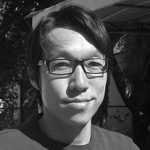Center for Ideas & Society Fellowships
Mellon Humanities Fellows
 David Biggs
David Biggs
Pacific Gyres and the Base Archipelago: An Environmental History of Militarized Circulations in the Pacific, 1945-Present
Over the next year, I will conduct a study of base-periphery shorelines in the Pacific (California, Guam, and Vietnam then continuing to sites in the Philippines, Okinawa, Hawai’i, and several atolls) with historical attention focused on the people—scientists, troops, families, refugees, laborers—and non-human life forms that circulated between them. This site-based focus will allow me to take advantage of rich troves of U.S. military records that not only document military actions but also “misfit” stories of protest, weedy invasives, and hybrid communities through texts, photography and maps, detailing what Espiritu (2017) terms the “military colonization” of the Pacific.
 Marissa Brookes
Marissa Brookes
Bringing Labor Back In: How Histories of Conflict Tame Corporate Power Over Time
Whether private governance is viable, let alone sustainable, is a question that has attracted great interest in recent years. To date, however, the literature on labor and private governance has focused on single-issue corporate campaigns, country-level agreements, and global framework agreements, leaving aside questions of campaigns’ and agreements’ contributions to private governance over the long run. My project thus examines labor transnationalism’s long-term impact on employment relations through an analysis of national and global unions’ evolving relationships with TNCs to hypothesize that the private governance arrangements that most effectively protect workers’ rights are those that emerge out of many years of active conflict, in contrast to top-down agreements drawn up without a historical context of struggle.
 Matthew King
Matthew King
Faxian and the Invention of Asia
The Record of Buddhistic Kingdoms, an autobiographical adventure tale authored by one of pre-modern Asia’s most ambitious travelers—a turn of the 5th century CE Chinese Buddhist monk named Faxian—is one of the earliest and most detailed accounts of Central and South Asia’s pre-Islamic Buddhist societies and one of the few surviving accounts of life along the Silk Road. Adopting an inter-Asian frame aimed at historicizing, and thus displacing Europe as the source of modernity in Asia, this project analyzes the translations of the The Record over time to show how Orientalist scholarship was re-purposed at the frontiers of the Western episteme, setting the ragged edges of empire, nationalist movement, socialist experiments, and the bloody displacement of refugee communities into radical different times and horizons of expectation.
 Jade Sasser
Jade Sasser
Many Cooks in the Kitchen: Stoves, Fuels, and Women’s Agency in the Global South
My second research project takes up questions of gendered health, environment, and technology through a focus on women’s everyday household energy use in the global South. In this project, I explore international development narratives and projects focused on distributing “improved” cookstoves to impoverished women, interventions that rest on a framework that identifies solid fuel use and traditional stoves as health and energy-related problems of the rural poor, specifically women, and that purports to alleviate the problems of gender inequality, rural poverty, and sustainable energy use through a technological solution: fuel efficient stoves.
 Stephen Sohn
Stephen Sohn
War Everlasting: The Militarized Technogeometries of Korean American Literature
With this fellowship, I will complete my monograph, War Everlasting: The Militarized Technogeometries of Korean American Literature, which will be the first of its kind to showcase how Korean American literatures repurpose the technologies and vocabularies associated with war in order to imagine less violent outcomes, on the one hand, and to combat the erasures of the defenseless and the expendable, on the other. This language of warfare—or as I call it, militarized technogeometries—is deeply embedded in the writings penned by Korean Americans, conditioned by Korea’s longer history as a site of conquest and violence, and employed by these writers to reconsider who must be represented, and how survival can still be achieved (and imagined) despite the war machine’s drive to instrumentalize technology for the production of death.
Senior Fellows
CIS Senior Fellows are Associate or full UCR Professors who are appointed for three year terms. Each CIS Senior Fellow receives $2000 per year for three years in research funds to facilitate a proposed research agenda that will be the focus during the 3-year appointment. Funds may be used for research-related travel, research assistance and support for participation in professional meetings. CIS Senior Fellows are expected to participate in the Center’s activities, including attending Center events, meeting with Mellon Mays Undergraduate Fellows at least once a year and offering at least one public lecture during the term of the appointment. Fellows are also encouraged to propose other ways they might enrich the life of the Center.
2017-2020
 Farah Godrej (Political Science)
Farah Godrej (Political Science)
Prison Yoga and Meditation: South Asian Text and Practice in U.S.
Farah Godrej is Associate Professor of Political Science at the University of California, Riverside. Her areas of research and teaching include Indian political thought, Gandhi’s political thought, cosmopolitanism, globalization, comparative political theory, and environmental political thought. Her research appears in journals such as Political Theory, The Review of Politics, and Polity, and she is the author of Cosmopolitan Political Thought: Method, Practice, Discipline (New York: Oxford University Press, 2011).
How do prison contemplative programs of yoga and meditation fit into conversations around mass incarceration? Is their logic compatible with political strategies that seek to dismantle mass incarceration? Or do they instead work to reinforce more conservative logics that depoliticize mass incarceration and sustain the status quo? The yogic, meditative traditions of South Asia are sometimes said to produce pacifying and politically neutering effects: their emphases on acceptance, non-judgment, non-reaction and the focus on the individual self are thought to isolate both the causes and effects of structurally-determined political outcomes, rather than attempt to change systemic social injustice. As a result, critics suggest such programs may depoliticize mass incarceration and sustain the neoliberal status quo, managing the incarcerated without challenging the fundamental validity of mass incarceration, serving to make it palatable and emphasizing individual responsibility over structural injustice. The imperative to improve life for the incarcerated may distract from an unjust system made more habitable, and its victims more compliant, producing accommodationist and depoliticizing attitudes among both its target population as well as the general public. However, many scholars also insist that yogic/meditative teachings can also be interpreted to generate attention to oppression and social injustice, and resistance to the status quo. My project asks: Are these practices being taught in incarceration facilities in ways that pacify, depoliticize or reinforce compliance with the logic of mass incarceration? Or do they offer relief from suffering while also drawing attention to
systematic injustice?
 George Haggerty (Emeritus, English)
George Haggerty (Emeritus, English)
HORACE WALPOLE: A Life in Letters
Horace Walpole (1717-1797) was the youngest son of England’s first “Prime” Minister, Sir Robert Walpole (1676-1745). A writer and collector, he was also an originator of the craze for all things Gothic in the later eighteenth century. He is the author of two of the great Gothic works of the age, The Castle of Otranto (1764) and The Mysterious Mother (1768). His home, which he transformed into a miniature Gothic castle called Strawberry Hill, was a touchstone for eccentric taste and exuberant imagination. There is no significant literary figure of the eighteenth century as much in need of a biography than the gothic novelist and inveterate letter-writer, Horace Walpole. He was precocious, articulate, and keenly observant. His letters have often been plumbed by historians and literary scholars for details about eighteenth-century politics, art, or social life; but they are also an amazing source of information about the life of their author, and they can begin to tell us an intimate account of this fascinating eighteenth-century gentleman. In this biography, which although largely literary in emphasis will also address every feature of this varied life, I hope to offer readers a more lively and vibrant Horace Walpole than the figure who has appeared in other works.
 Stephen Sohn (English)
Stephen Sohn (English)
Recalculating Combat: The Militarized Technogeometries of Korean American Literatures
Stephen Hong Sohn, a former University of California President’s Postdoctoral fellow (2006-2007), has edited or co-edited a number of different works and special issues, including Transnational Asian American Literature: Sites and Transits (Temple University Press, 2006); Studies in the Literary Imagination (SLI, Vol. 37.1, Spring 2004) on Asian American Literature; MELUS (Winter 2008) on the topic of “Alien/Asian”; and Modern Fiction Studies on the topic of “Theorizing Asian American Fiction” (2010).
With the support of this fellowship, I will be able to complete my monograph, Innovating Stalemate: The Militarized Technogeometries of Korean American Literature. My book will be the first of its kind to analyze how Korean American literatures repurpose the technologies and vocabularies associated with war in order to imagine less violent outcomes, on the one hand, and to combat the erasures of the defenseless and the expendable, on the other. This language of warfare—or as I call it, militarized technogeometries—is deeply embedded in the writings of Korean American writers. Thus, this kind of literary aesthetic is conditioned by Korea’s longer history as a site of conquest and violence. At the same time, these writers employ such the coded language of war to reconsider what must be given attention, who must be represented, and how survival can still be achieved (and imagined) despite the war machine’s drive to instrumentalize technology and innovation for the production of death. My proposed monograph will further elucidate the complexity of Korean American war representations, appealing to a broad range of humanities scholars, including: Asian American literary scholars; humanist scholars in History, English, Ethnic Studies, Media and Cultural Studies, and Comparative Literature; and the general public, especially in light of national discourses promoting a broader understanding of our cultural histories.